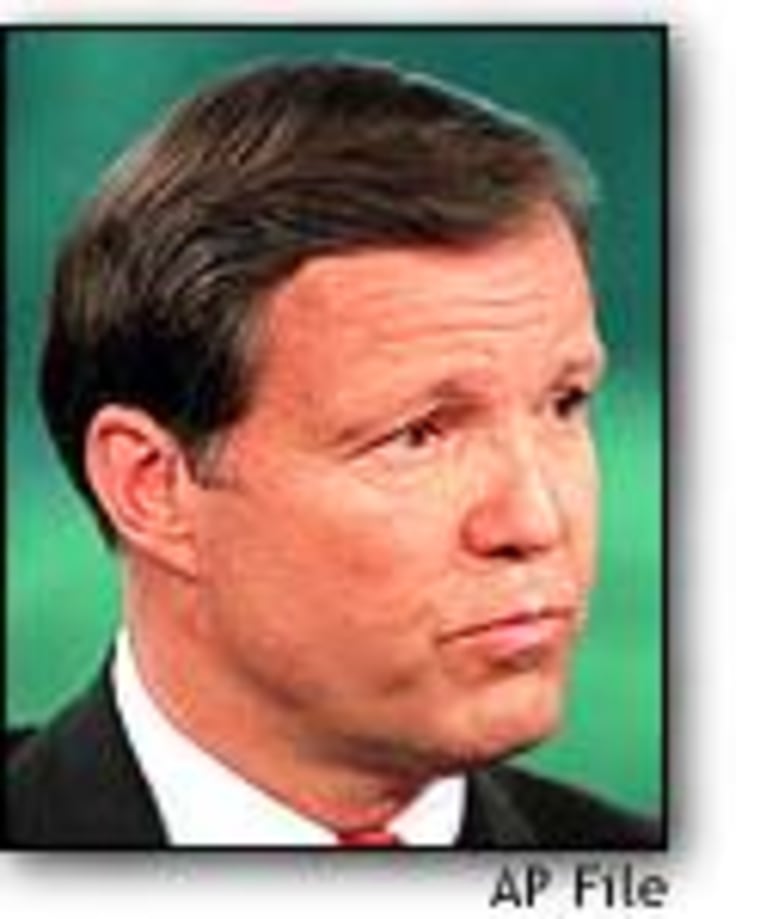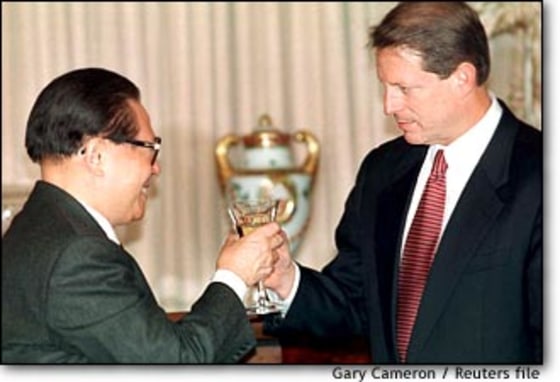As Americans bid farewell to the Year of Monica, the Chinese-speaking world ushered in the Year of the Rabbit. With ties between the United States and China increasingly strained, a presidential campaign looming and the Republican Congress in a bitter, angry mood, Beijing is now in the crosshairs. Rabbit season is about to begin.
The relationship between the United States and China is in serious trouble. And that’s a problem for the rest of the world, because the quality of the ties between these two countries likely will mean the difference between war and peace in the coming century. While Washington staged its own version of a Chinese opera these past few months, far more serious China scenarios have developed that now threaten to set Sino-American relations back a decade.
Driven by scandals, abuses and threats both real and imagined, China is poised to burst onto the American political agenda with a prominence it has not enjoyed since the communist takeover in 1949.
Will the millennium begin with Republicans and Democrats arguing, as they did 50 years ago, over “who lost China?” Perhaps not. But the short-term political calculus that appears to be driving events in both countries threatens to turn what is currently a rivalry into an resource-sapping, ideologically divisive replay of the Cold War.
A VICIOUS CYCLE
The elements that converged into this larger tempest are not new. At the policy level, the debate pits proponents of “constructive engagement” against advocates of “containment.” The engagers, including the Clinton administration and American corporations, essentially argue that China is too large to bully and should be encouraged through trade and dialogue to act “responsibly.”
The forces for containment, led by hawkish Republicans, dovish human rights advocates and a diverse mix of religious, pro-Tibet and anti-communist activists, believe China is sure to develop into a formidable threat to the United States and western liberal values unless its confronted now, while the West has some things China needs: capital, technology, and access to markets.
TIMING IS EVERYTHING
Over the next several months, every light-sensitive issue in the U.S.-China relationship has a date to appear in the historical, political or diplomatic spotlight.
Later this month, the Pentagon delivers to Congress a secret report on China’s new deployment of ballistic missiles near Taiwan.
In March, the United Nations Human Rights Commission begins its annual hearings in Geneva with the United States pressed to reverse its decision to avoid confrontation. Secretary of State Madeleine Albright is also due to visit Beijing.
April brings China’s Prime Minister Zhu Ronghi to Washington, just as the human rights conference reaches its climax.
In May, the United States will be called upon to say whether it will support China’s membership in the World Trade Organization.
June brings to Beijing an unwelcome reminder of why relations with Washington remain cool: the 10th anniversary of the Tiananmen Square massacre.
NOT ALL POLITICS IS LOCAL
That lineup of diplomatic difficulties would be challenging enough for this fragile relationship in a good year.
Yet this year finds an added political dimension sure to make each encounter more difficult. The Republican Congress, always critical of the Clinton Administration’s handling of China, is newly embittered by its the collapse of its impeachment case against the president.
With Vice President Al Gore, poised to lead his party’s ticket in the next election, Republicans are searching for issues that might unite groups that found Clinton’s sexual peccadilloes and legal obfuscations less than constitutional. China, in many ways, fits the bill.
Unions and displaced workers are angry at the record $60 billion trade deficit the United States ran with China in 1998. Human rights and environmental advocates fume at continuing dissident arrests, the Three Gorges Dam project and repression in Tibet. Religious conservatives are opposed to China’s forced-abortion population control programs. Anti-communists see no difference between Mao and Jiang Zemin. The military and its supporters view the potential rise of any nation toward “parity” with America as a threat to national security.
PLUMBING THE DEPTHS
Three outstanding issues have the ability to convert what so far has been a debate in the pages of Foreign Policy (and in MSNBC’s Opinions section) into a divisive national political issue for America: illegal missile technology transfers, the Chinese military’s tampering with the 1996 political campaign and a brewing dispute over the deployment of a U.S. anti-missile shield in Asia.
Leaking technology: A Congressional investigation, led by California Republican Rep. Christopher Cox, has already confirmed that the Clinton administration failed to prevent the U.S. aerospace firms Loral and Hughes from giving China information that has helped Beijing improve its ballistic missile capabilities.

How much of the report will be declassified remains unclear, though Cox and other Republican leaders have said they want virtually all of it made public. It appears clear the GOP plans to use the report for political purposes.
Greasing the wheels: Illegal campaign donations to the Democratic National Committee during the 1996 election have been traced to China’s military, the People’s Liberation Army. As my colleague Robert Windrem reported last week, Johnny Chung, a one-time Democratic fundraiser, has told the grand jury investigating the China funds that Beijing was seeking to influence U.S. policy decisions, including perhaps technology transfers like the ones at issue in the Hughes/Loral case. Republicans are furious that Attorney General Janet Reno decided against appointing an independent prosecutor in the case.
Playing chicken: Amid the investigations of export controls and campaign funds, the Pentagon leaked a report to The New York Times claiming that China has been deploying newer, longer-ranged missiles along its southern coast near Taiwan.
The deployments are believed to be a direct response to an American plan to create an anti-missile umbrella in Asia, ostensibly to protect Japan and South Korea from missiles launched by the erratic North Korean regime. Not surprisingly, Taiwan, given the provocative Chinese missiles that were lobbed into its territorial waters in March 1996, has asked to be included. Beijing has warned that if such a missile shield is provided to Taiwan, China will refuse to sign a treaty banning ballistic missile sales abroad. If that happens, relations with the United States will be severely hurt.
COOLER HEADS?
It is hard to imagine Congress and the president — particularly this Congress and this president at this moment in history — navigating a safe passage through these troubled waters. The long-term interest of the United States — and, incidentally, of China’s people, about whom so many human rights groups, religious activists and U.S. business leaders claim to care — would argue for a debate that keeps the big picture always in view. China is a power to be reckoned with, not railed against. Where its actions threaten the United States or its allies, the United States must be firm. Where its behavior abuses human rights, the United States must speak out.
But when U.S. policy toward China becomes tangled in America’s own political system, the debate needs to be more focused. After all, whether you apply the logic of American capitalists, political consultants or military strategists, all the Chinese did was to exploit opportunities provided by Washington. That’s hardly the foundation for an ideological campaign against China. But then, that’s the long-term view, isn’t it?
Michael Moran is MSNBC’s International Editor
